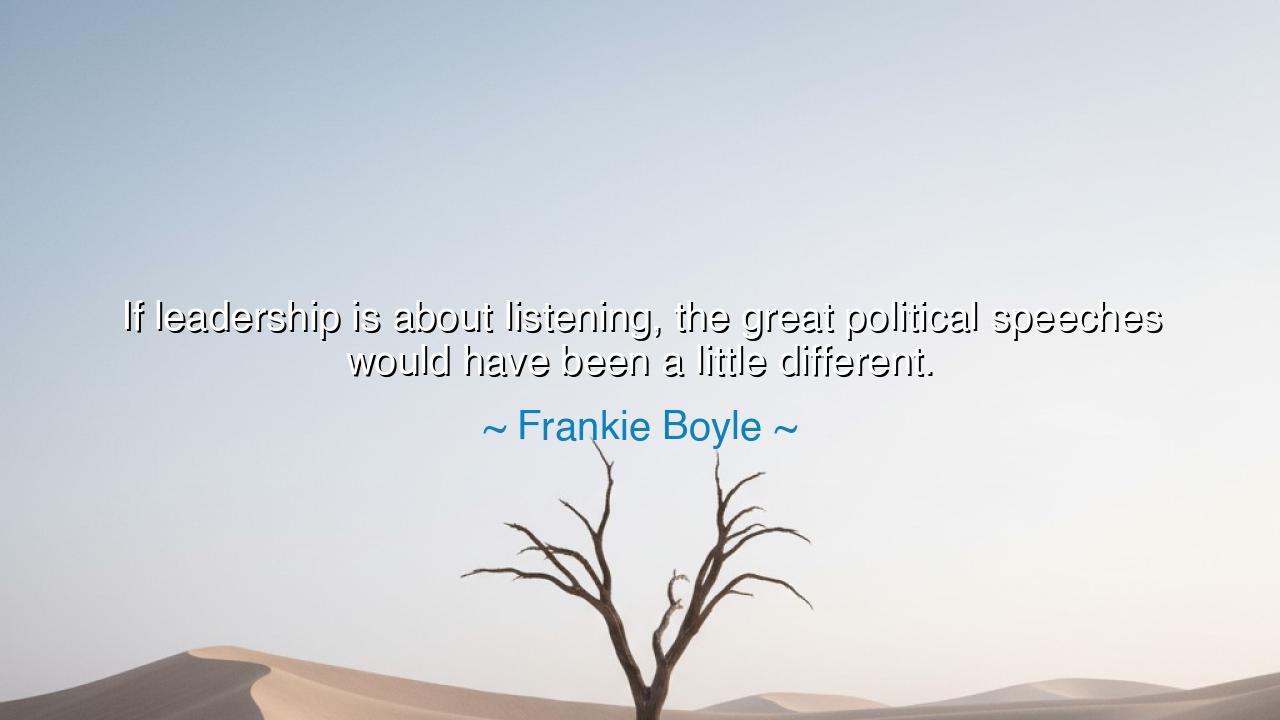
If leadership is about listening, the great political speeches
If leadership is about listening, the great political speeches would have been a little different.






Hear, O seeker of truth and governance, the sharp yet subtle wisdom of Frankie Boyle, whose jest cuts deeper than many sermons: “If leadership is about listening, the great political speeches would have been a little different.” Though spoken with humor, these words carry the weight of an age-old truth — that many who claim to lead speak often, but hear little; they raise their voices to command the crowd, yet close their ears to the murmurs of the people. In this jest lies judgment; in this laughter, a mirror is held before the powerful.
The meaning of the quote is both ironic and profound. Boyle points out the contradiction between the ideal of leadership and its practice. We are told that true leadership is about listening — about understanding, humility, and service. Yet history is filled with leaders who built their empires on speeches, not on silence; on persuasion, not on perception. The great orations of history — ringing with passion, defiance, and pride — often show leadership as performance, not communion. In this sense, Boyle reminds us that perhaps if leaders truly listened, their words would not thunder from podiums, but flow from the wisdom of the people they serve.
The origin of this insight arises from both satire and experience. Frankie Boyle, a Scottish comedian known for his biting intellect, speaks not as a cynic but as a keen observer of human nature and power. His words echo the lessons of democracy’s long struggle — that the loudest voices often drown out the quiet truths. The ancient philosophers, too, knew this. Lao Tzu said, “The best leaders are those whose existence the people barely know,” meaning that true leadership leaves no need for grand speech, for it listens and acts in harmony with the people’s will. Boyle’s jest, then, becomes a modern echo of that ancient humility.
To understand his meaning, look to history. When Abraham Lincoln spoke the Gettysburg Address, his words were few — humble, mournful, and deeply attuned to the nation’s sorrow. He had listened to the pain of a divided people, and thus his speech, though brief, carried the depth of compassion. Contrast this with the oratory of tyrants, whose words filled hours but whose ears heard nothing beyond applause. Adolf Hitler’s speeches moved crowds, but his deafness to conscience destroyed millions. Thus, the difference between noise and wisdom is not in volume, but in listening.
Yet Boyle’s wit also points inward — to the modern age, where leaders speak in endless loops of slogans and soundbites, yet rarely pause to truly hear the cry of the ordinary heart. In every generation, politics risks becoming theatre: applause replacing understanding, performance replacing humility. Boyle’s humor tears through this illusion, reminding us that leadership without listening is an empty echo — a speech delivered to the self, not to the soul of a nation.
The ancients would have called such wisdom parrhesia — the courage to speak truth to power through irony. Just as Diogenes walked through the streets of Athens with a lantern in daylight, saying he sought an honest man, Boyle lights the same lamp in our age. His jest is not cruelty, but clarity: a reminder that when a leader ceases to listen, their words lose meaning, and their authority becomes hollow. The true leader, like a wise elder, listens first — for in the quiet, the heart of the people reveals its will.
And what lesson, then, should you take, O listener of this teaching? It is this: to lead, one must first hear. Speak less, and observe more. Before you answer, understand. Whether you guide a family, a community, or a nation, remember that leadership begins not with speeches, but with silence — the silence that listens deeply and acts wisely. The greatest words ever spoken were born from the wisdom gathered in listening.
Thus, in his jest, Frankie Boyle delivers an ancient truth wrapped in modern wit: that the ear is the first instrument of power, and the heart that listens is mightier than the tongue that shouts. Let your leadership — in whatever realm you walk — be not a performance, but a practice of hearing. For when a leader truly listens, their words, however few, will echo across generations — not because they were loud, but because they were true.






AAdministratorAdministrator
Welcome, honored guests. Please leave a comment, we will respond soon